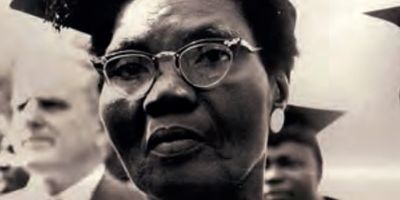Google Honors Nigerian Feminist Icon, Funmilayo Ransome-Kuti, With Doodle
Today would have been the Nigerian trailblazer's 119th birthday.
Pay your Google Doodle extra attention today. It is honoring Funmilayo Ransome-Kuti, an activist, teacher and politician, on her birthday. She would have been 119 today. Ransome-Kuti became a prominent Nigerian icon as she fought for women's rights, including women's right to vote, and was constantly breaking barriers—including being the first woman in Nigeria to drive a car and ride a motorcycle. Her work earned her two beloved monikers: "The Lioness of Lisabi" and "The Mother of Africa." If that wasn't enough, she's also Fela Kuti's mom.
The doodle, illustrated by Nigerian-Italian artist Diana Ejaita, blends Ransome-Kuti's accomplishments into Google's logo and show her actions reflected in women who bear her likeness. The artist is known for using stark blacks and soft colors to show the "strength of femininity," perfect in a portrait of Ransome-Kuti. If you can't view the doodle automatically, that is because it will only show up for searches in Nigeria. But, don't worry, check it out via Google Doodle's twitter post below.
She was a powerful and revered woman who fought tirelessly against colonialism and for the accessibility of education. After she herself was educated overseas in the UK, she returned to Nigeria, dropped her English names and began promoting Nigerian culture over British, constantly speaking Yoruba over English in governmental settings and with authorities. She was a fierce champion of education, feminism, independence and traditional culture throughout her life.Her life came to an end when she was thrown from a second-floor window at the age of 78, when 1,000 military personnel stormed Fela's compound.
Her legacy is profound. From being the only woman to join the Nigerian delegation that lodged formal complaints about colonial rule in 1947 and being a part of the independence negotiations to establishing the Abeokuta Ladies Club in 1932 which brought educated women and market workers together to create Nigeria's first adult education programs.
- Seun Kuti And Nneka Celebrate Incredible Black Women In This ... ›
- Mother Africa: 12 Iconic Women Who Have Shaped Our Culture ... ›
- These Women Are Breaking Boundaries In Nigeria's Creative Spaces - OkayAfrica ›
- Here Is What Africans Googled in 2022 - OkayAfrica ›
- Here Is What Africans Googled in 2022 - OkayAfrica ›
- Google Honors HIV/AIDS Activist Nkosi Johnson with Doodle - OkayAfrica ›
- In 'Funmilayo Ransome-Kuti,' Bolanle Austen-Peters Presents a Nuanced Story of an Icon - Okayplayer ›
